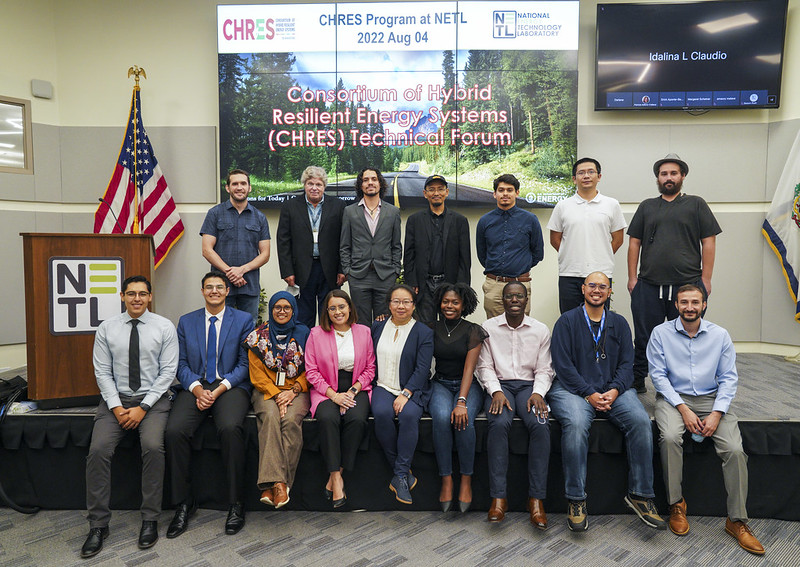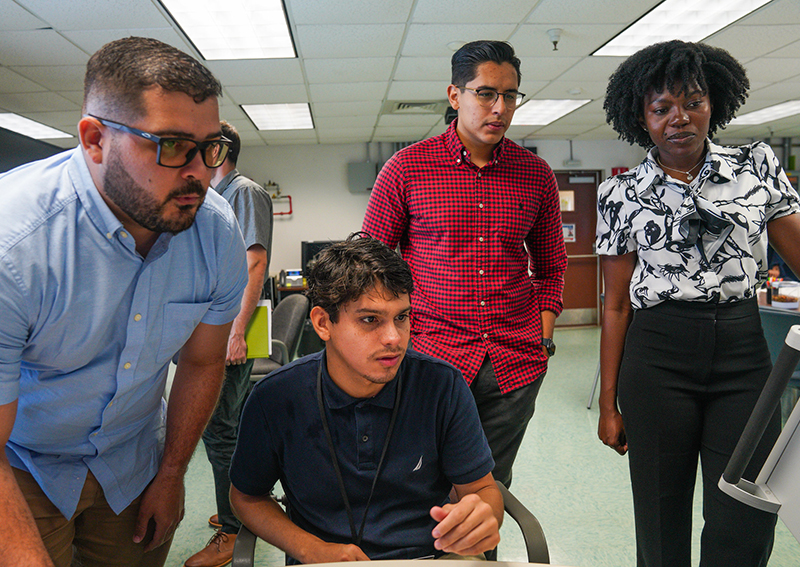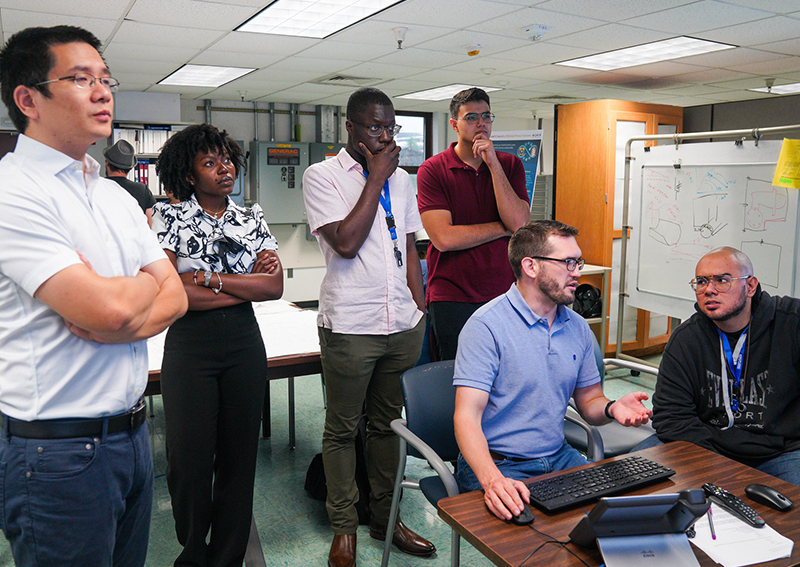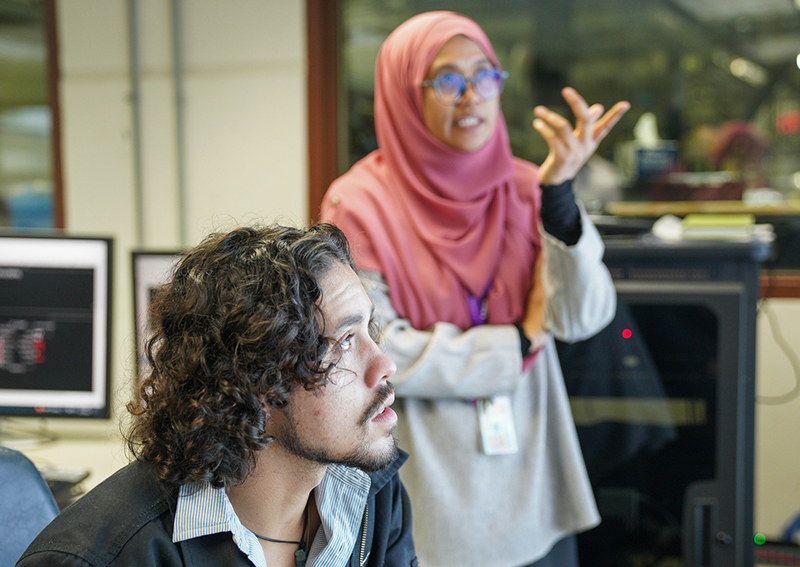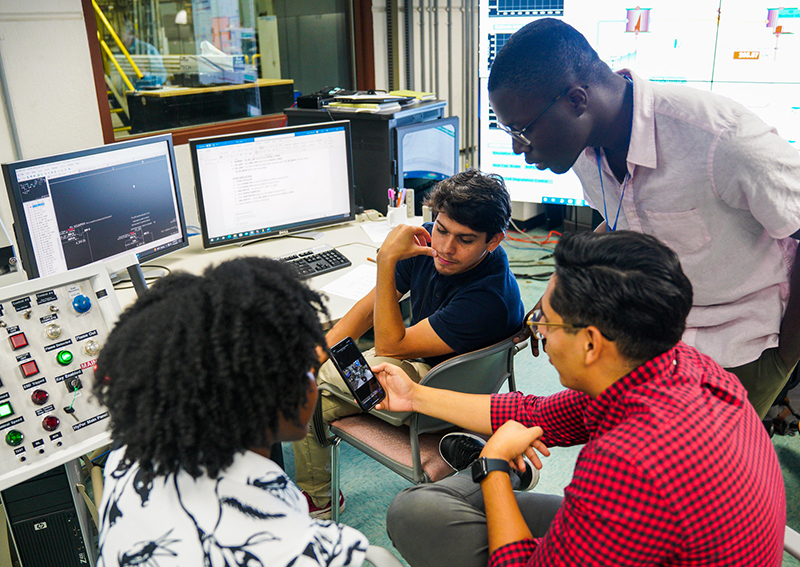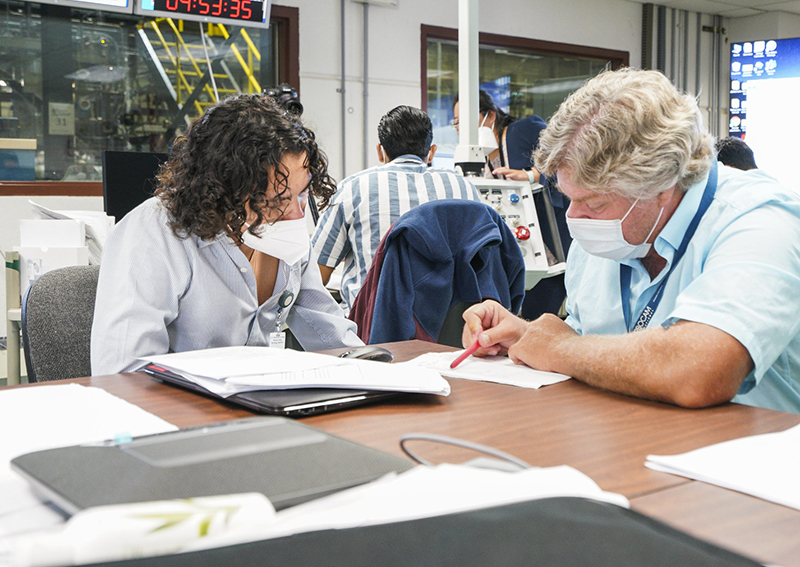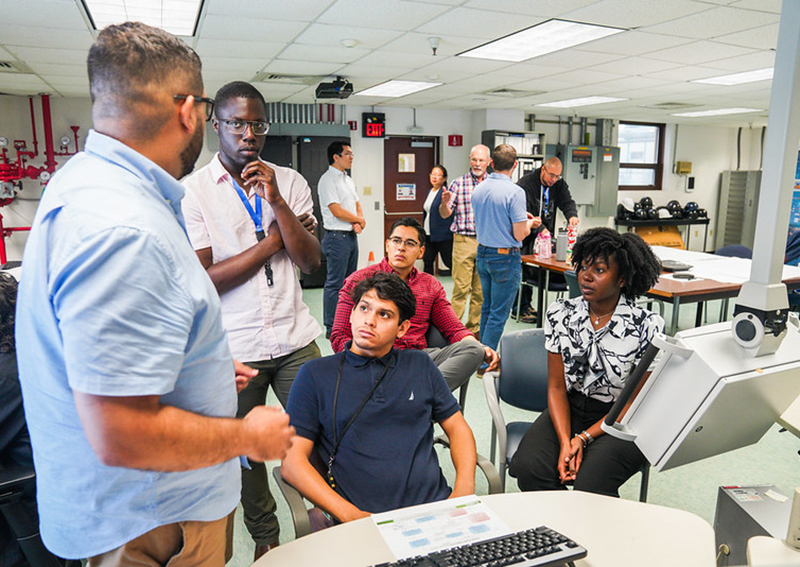Consortium of Hybrid Resilient Energy Systems (CHRES)
The CHRES program provides summer internship opportunities to undergraduates, doctoral students, and faculty.
The expected outcome of the research opportunities is to build a sustainable professional and academic pipeline of next generation engineers and scientists who are ready to take on the challenges of current and future energy systems.
At NETL, candidates don’t need experience; that’s what we’re here for! You will be assigned a mentor who will educate and guide you throughout your summer appointment. You will be part of a highly proficient team who truly cares about you and your success. They are passionate about teaching the next generation of STEM professionals and increasing capability and experience at NETL. You will have access to world class researchers and scientists; use one-of-a-kind equipment and facilities; collaborate with subject matter experts and professionals in your field; author/co-author papers, presentations, and other publication materials; attend/present at conferences and workshops.
CHRES Internship Opportunities
When: Application deadline: January 31, 2025 (Program Dates: June 2, 2025 to August 8, 2025)
Where: National Energy Technology Laboratory in Morgantown, WV; Albany, OR; Pittsburgh, PA
Financial Benefits: Stipend based on academic level; housing & travel allowance.
Professional Internship Program
(PIP)
To be eligible, you must:
- Be a U.S. citizen
- Be an undergraduate or graduate student in good standing at one of the four consortium universities listed above
- Have an overall minimum GPA of 2.5/4.0
- Be at least 18 years of age at the time of appointment
- Provide proof of coverage under a health insurance plan prior to the beginning of the internship
Experience with MATLAB-Simulink programming, thermodynamics, middleware interface, and/or dynamic controls is a plus. Please include on your resume and application.
Apply
Faculty Research Program
(FRP)
To be eligible, you must:
- Be a U.S. citizen
- Be a full-time regular permanent faculty member at one of the four universities listed above with a research interest in NETL core R&D areas
- Be at least 18 years of age at the time of appointment
- Provide proof of coverage under a health insurance plan prior to the beginning of the internship
- Sabbatical appointment candidates must include a statement describing the financial arrangements with their academic institution, including fringe benefits paid by the institution (state as a percentage of salary and itemize)
Experience with MATLAB-Simulink programming, thermodynamics, middleware interface, and/or dynamic controls is a plus. Please include on your resume and application.
Apply
HYPER Project Descriptions
NETL's Hybrid Performance (HYPER) facility is a one-of-a-kind facility built to evaluate dynamic operations and to develop control strategies for solid oxide fuel cell / gas turbine (SOFC-GT) hybrids, with expanded reconfigurability and capability. To exploit the advantage of both numerical models and physical systems, as well as gapping the inaccessible technologies, a cyber-physical system (CPS) approach was implemented at the HYPER facility. A CPS fuel cell system was built and integrated with turbomachinery and other supporting components in real time, forming a pilot-scale SOFC-GT integrated system. NETL's HYPER team is seeking researchers for projects in the following areas:
Mentors: David Tucker , Biao Zhang, Nor Farida Harun
SMR will be simulated using the Hyper cyber-physical facility at NETL to identify potential for risk mitigation and preliminary development of control strategies needed to optimize transient system response to grid dynamics and SMR heat rate needs. The project provides opportunities for interns to be involved in system simulations, dynamic component model development (SMR, SOFC, SOEC, HX, GT), cyber-physical systems, design of experiments, controls research, and hardware-in-the-loop simulations.
Mentors: Nor Farida Harun, Nana Zhou, David Tucker
This project is to develop a fuel processing and carbon capture system using the Cyber-Physical approach. Tasks include numerical simulations, system analysis, engineering design, control assessment.
Mentors: David Tucker, Nor Farida Harun
One particular research interest of the HYPER project is to explore the capability of this hybrid technology under a fuel flexible environment. A one-dimension reformer was built and implemented with the SOFC model in the dSPACE platform. This project will engage in a fuel flexibility modeling study to determine the impact of an array of secondary fuels on SOFC-GT cycle efficiency, and to identify key performance and cost drivers.
Mentors: Danylo Oryshchyn, Biao Zhang, Jose Colon
A novel cycle, composed of a solid oxide electrolyzer cell (SOEC), a solid oxide fuel cell (SOFC), an internal combustion engine (ICE), thermal management, and carbon capture technologies is proposed. This cycle aims to investigate the efficient and cost-effective production of hydrogen and electricity. System studies will be performed for cycle optimization to improve lifespan, efficiency, costs, and operability.
Mentors: Nor Farida Harun, David Tucker
The aim of this project is to evaluate the potential for energy storage in hybrid power cycles to enable more effective load following. This will build upon the analysis conducted previously that included both renewables and SOFC-GT hybrids. Energy storage concepts will be simulated and virtually integrated into hybrid cycles. They will be tested for their ability to provide flexibility and resiliency in power systems which have a high proportion of variable renewable power sources, such as wind and solar.
Mentors: Jose Colon, Nor Farida Harun
NETL researchers have pioneered the cyber physical approach to enable rapid evaluation of a variety of operational configurations while maintaining the accuracy of process dynamics. A cyber-physical reformer incorporates real-time models, experimental hardware, and dynamic data transfer and control. Tests will be planned, conducted, and analyzed to verify dynamic models and evaluate the process limitations of extracting the heat from either auto-thermal reforming, heat exchange in turbine exhaust, or from the SOFC itself.
Mentors: David Tucker, Nana Zhou
One inherent complexity of the SOFC-GT hybrid system comes from wide discrepancies in the individual component response times, affecting the startup and shutdown of the hybrid system critical dynamic operations. For turbomachinery, this will involve avoiding compressor surge and stall. For the fuel cell system, it will require the thermal management and electrochemical light-off. This project will analyze previous system identification data and develop and demonstrate an automated dynamic control within the constraints of the supervisory control.
Mentors: David Tucker, Biao Zhang
The penetration of renewables requires other power plants to have a rapid load following. This project will investigate the SOFC-GT’s load following ability by operating the HYPER facility in response to Idaho National Lab’s grid simulator demand. A supervisory control scheme for load will be developed. The objective is to divide power generation between the fuel cell and the turbine during power demand changes, i.e., responding faster with the gas turbine and then adjusting the fuel cell load over time, while avoiding excessive temperature oscillation in the fuel cell. Temperature variation represents a constraint in the control problem.
Mentors: Nor Farida Harun, David Tucker
In this project, an integrated energy system model based on a novel cycle will be developed for system studies to explore design cases for improved operability and efficiency. The system may include a solid oxide electrolyzer cell (SOEC), a solid oxide fuel cell (SOFC), thermal management, and carbon capture components. Part of the model will be developed in Matlab Simulink and the balance of the plant model will be built in Ebsilon. These two models will be coupled eventually to allow full loop iterations for the system analysis.
Mentor: Biao Zhang, David Tucker
Carbon-neutral electro-methanol (e-methanol) can be produced using green H2 from steam electrolysis powered by renewables and recycled CO2 from direct air capture (DAC). It has great environmental benefits, thus can potentially displace the current fossil-based emission-intensive methanol production technologies. E-methanol has broad applications such as a precursor to commodity chemicals, an energy carrier for long-term renewable energy storage, and an e-fuel in the transportation sector. However, the multi-step e-methanol production process requires an integrated energy system (IES) approach, in which the energy and mass flow should be analyzed for thermodynamic analysis and estimate system efficiencies. This project aims to develop a platform for energy and mass flow analyses of this integrated energy system, likely using a spreadsheet and/or MTALAB. Participants will learn the concept of integrated energy system, system analysis, and cyber-physical simulation. This project can help to improve the interoperability and flexibility of integrated energy systems for e-methanol production for industrial decarbonization, facilitating the transformation to a sustainable energy future.
Mentor: Eric J. Popczun, Dushyant Shekhawat
In addition to its role in medical and biological settings, pure oxygen gas streams also have a wide variety of industrial uses, including the clean combustion of carbonaceous fuels. By utilizing a pure oxygen stream, as opposed to air, many common impurities can be avoided in the combustion atmosphere, leading to clean CO2 production, making CO2 capture easier. Industrially, pure oxygen is commonly produced through
cryogenic separations, which is cost-prohibitive at the small and/or modular scale. At NETL, we have investigated perovskite oxygen carrier materials that can reversibly extract oxygen from air and release it in various gaseous atmospheres at elevated temperatures (300-800°C). While the energetic penalties of traditional heating can be mitigated through the utilization of waste heat from other reactors or machines, microwave heating has the potential for even lower energy requirements due to targeted heating. In the proposed work, a perovskite oxide will act as a microwave absorber to enable its thermal oxygen storage properties.
Mentors: Ashley Daniszewski, Dushyant Shekhawat
As the global demand for the reduction of greenhouse gas emissions, the need to capture and utilize carbon dioxide in new and innovative ways is rapidly increasing. This project will explore the catalytic utilization of carbon dioxide to produce value-added chemicals using microwave technology. We will identify suitable catalysts systems and test different reaction parameters using advanced microwave reactors systems, while also investigating what’s happening on the surface of the catalyst using novel in situ microwave FT-IR. This will result in a fundamental understanding of microwave technology’s role in assisting in catalytic performance and utilization of carbon dioxide.




